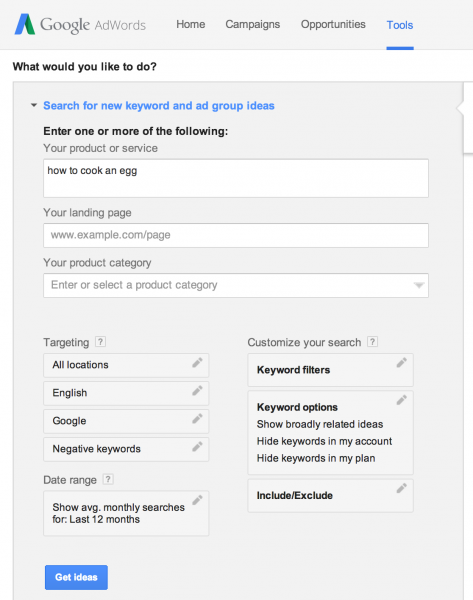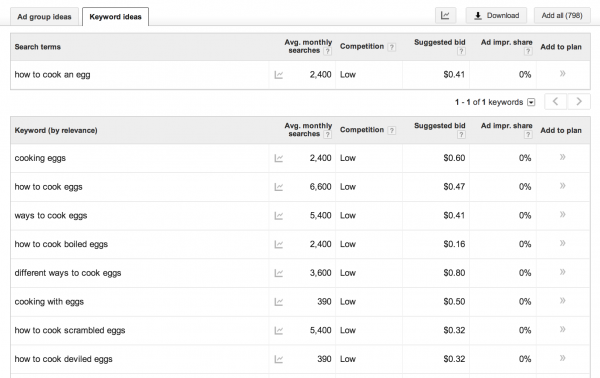All SEO keywords are not equally important – volume and competition matter!

True or false?
The most effective SEO keyword strategy is to compete vigorously for top placement on the most popular keyword suggestions returned by the Google Keyword Planner for a given keyword phrase.
If you answered “true,” you’re in good company, but you might want to reconsider.
[text_ad]
On the surface, aiming for the most popular SEO keywords seems like a good strategy. But in reality, it can be like trying to win the war with a peashooter. The big guys with the bazookas may have you outgunned.
The little-known fact is, if your SEO keyword strategy is targeting only highly popular and competitive terms, your odds of SEO success are minimal. Alternatively, you might want to settle for aiming at smaller targets … and succeeding.
Here’s how to decide on the best SEO keyword strategy for your website.
An effective SEO strategy begins with extensive research. Sure, you need to know which keyword phrases are searched most frequently by customers in your market. However, that information alone is not enough to guide your SEO efforts and create the right keyword-rich editorial content.
Beyond simply “searched most frequently,” you need to know a number: how many searches are done each month on each individual keyword phrase in your keyword universe.
Finally, you also need to know what the competition is for those phrases: how many pages currently serve up those phrases.
The simple but often overlooked truth is this: There’s a popularity contest going on within your keyword universe, and some keyword phrases are used much more often than others. That can create an intense competition — and often your website won’t have the gravitas to win.
Pick keyword fights you can win
If you do the math, you’ll realize there’s a keyword risk ranking inside each keyword cluster in your keyword universe, and this information can help prioritize your choices. You may discover that it’s unwise to target the most popular keyword phrases, especially if there’s a lot of competition for those phrases.
The best SEO keyword strategy is to target keyword phrases that are more modest in popularity, and for which there is little competition.
To use an economic metaphor, you’re looking for modest demand and low supply.
The Google Keyword Planner can tell you the demand.
If you have an AdWords account, Google will allow you to use its Google Keyword Planner.
Once logged in, choose the option to “search for new keyword and ad group ideas.”
Then, enter the topic you think you want to write about. For example, if you wanted to write a blog post about how to cook an egg, your screen might look like the image below. You can also add in words you’d like to exclude from your keyword results, or choose only to search for the most popular keywords in a certain country or region.

Click the “Get Ideas” button, and then click on the “Keyword Ideas” tab to see the various popular keywords related to the search phrase you entered.

From here, you’ll see how many people are searching for each phrase per month. For your original phrase, “how to cook an egg,” you’ll see that 2,400 people per month search for that phrase. There are also 6,600 people searching for “how to cook eggs” and 5,400 searching for “ways to cook eggs.” Similarly, there are 2,400 searching for “how to cook boiled eggs.”
Pick some keywords you like based on competition, and then continue to the next step of finding their competition. (NOTE: Unlike the past, we’re seeing evidence lately that Google considers singulars and plurals like “egg” and “eggs” to be the same. Copywriters everywhere are heaving sighs of relief.)
To do this, go to Google and search for your keyword phrase in quotes. Why quotes? While most users don’t use them, you have to because otherwise your search results will include every page that has “how to cook” and “eggs” somewhere on the page – not necessarily together. That’s not of use to you, so always remember those quotes.
Unfortunately, your original phrase, “how to cook an egg” has more than 2 million competing pages in Google, which means it will be very hard for many publishers to rank highly in Google on this term. Many of the other keyword phrases chosen above have even more competition.

To find keyword phrases you have a better chance of ranking on, go down your list of results to find something with more reasonable search competition.
“How to cook boiled eggs” only has 155,000 competing pages.
And the keyword phrase “how long to boil eggs” has 74,000 people searching for that exact phrase every month, and there are only 38,000 competing pages.

This is what we’d call a blockbuster keyword because the likelihood of being able to score a page-one position for this keyword is high with only 38,000 competing pages. And if you can rank high for this keyword, you’re going to get a high percentage of those 74,000 searchers, equaling to 888,000 searches per year.
[text_ad]
Using the Keyword Competitive Index (KCI)
This relationship of demand to competition is measured by the Keyword Competitive Index (KCI).
The KCI is the estimated annual search impressions (global monthly searches taken from the Keyword Planner, multiplied by 12 months) divided by the number of exact match search engine results (the competition) at a point in time. In the example above, you have 888,000 estimated annual impressions divided by 38,000, equaling a KCI of 23.
All of this data, including the number of existing website pages, searches, and KCI, it part of what we call the Google Visibility Report (GVR), which we use to track our own and our clients’ SEO performance.
The “sweet spot” for your SEO efforts is often a keyword phrase with a high KCI. At Mequoda Daily, we generally consider any keyword phrase with a KCI of .5 or better to be a high value, low-risk target. A keyword phrase with a KCI of .1 to .49 is a B-grade target. Anything with a lower KCI is not generally a reasonable target for Mequoda Daily and most of our clients.
As you might be able to tell, “how long to boil eggs” is a pretty impressive KCI, but it only took minutes to find it. If you had written an article about “how to cook an egg,” your article would have sunk into World Wide Web forever, never to be seen again.
The subtle power of “how to”
The subtle power of “how to”
Here’s a tip that every online editor and copywriter should know.
Many people start their search by typing the words “how to” and a verb in the query box. Adding “how to” and verbs to your keyword phrases can result in optimal rankings. Test it out with the GKP and see for yourself.
Takeaway: If you don’t consider volume and competition, your SEO success will be random.
The Google Visibility Report enables you to target, track and manage your SEO efforts and results. Over time, it will reveal whether you have correctly evaluated the risk of a particular SEO keyword target.
Perhaps most important, the GVR will enable you and your online publishing team to discover the best SEO keyword phrases to target for attracting the most high-quality organic traffic to your website.
—–
This post was originally published in 2009 and is regularly updated.



Still a lot of parameters to determine the ranking of a website in the search engine.
Nice informative post which is very interesting to read, good work by writer keep it up.
Hi,
Thank you for your article. It has been an extremely informative and enriching read.
I have a question with regards to searching for competing pages. May I ask for the rationale of searching say “how to cook an egg”, instead of allintitle: “how to cook an egg”.
Thank you.
Regards,
Marcus
This is very powerful advice. Using overly saturated keywords makes it almost impossible to rank well. Choosing keywords more carefully and thoughtfully can really boost your SEO efforts.
hi,
need some claryfication.
Ive just tried to rank for some keyword, not too competitive with 1900 searches per month exact match.
so after 48h and one link pointing to it it shows first page but only when i type it between quotes, and nothin without quotes.
does that mean it is a keyword worth trying to rank for, by building various and relavant links to it?
is it a sign that “yes that is a good key word” and i should rank fast for it even without quotes, with a bit of more content on my site and linkbiulding around it.
thanls a lot
david
Open up Google Advance Search and type in your phrase on the 2nd line where it says “this exact word or phrase.” No quotations needed. Now go down to the second section and select Australia for the region. Run the advanced search. Your results will show up without the statistic bar. Here’s the secret….select the Search Tools link and the “About x,xxx results” will magically appear. Good luck.
Great article, what I’m not sure is how to calculate the KCI on a local basis (in my case Australia). The new keyword planner tool will give me the number of matches (which BTW gives very different results to the old keyword tool even for an exact match).
But my problemis when I try to get the number of google listings for a keyword for just Australia, google does not reveal the number?
Thanks, and great website very useful!
Les
Hi guys – a very useful technique which I’ll be adopting for all my future keyword research. Could I just clarify something: Is the monthly average search figure you use in your KCI calculation (x12 months) based on BROAD match figures and not ‘Phrase matched” results (when we use inverted commas in the GKT) as you suggested we include when ascertaing competition numbers?
So I guess what I’m asking is should the equation read like this: “The KCI is your estimated annual search impressions (monthly average searches taken from the GKT BROAD MATCH search x 12 months) divided by the number of exact match search engine results (the competition) at a point in time…”
Thanks for your help, and again, a very helpful post.
Cheers
Steve
Hi Steve,
Thanks for the comment and glad you enjoyed the post. We always base our numbers on the exact match figures opposed to broad match.
All the best,
Chris
nice
nice site I like and I sure to visit, well done
I used to struggle with keyword research, couldn’t figure it out to save my life. I wouldn’t know a good keyword even if it came up and bit me. I found some software which helped, and your post offered up some good key points to think about.